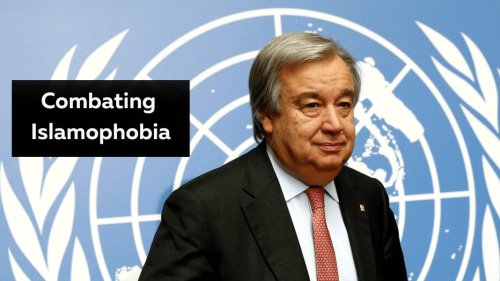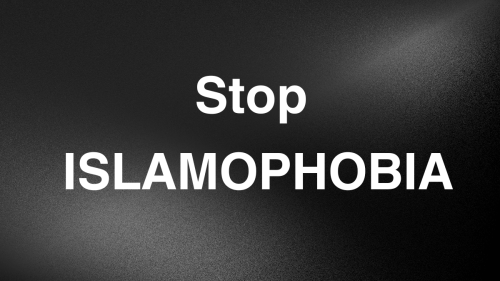Know your enemy (Hint: it's not Muslims)

It’s time to get real about Middle Eastern politics that now dangerously spill over into our Western lands.
It’s time to get real in accurately identifying the enemy, in understanding what that enemy wants and in being able to respond to that enemy’s ongoing threat.
The ancient Chinese strategist Sun Tzu said, “He who lacks foresight and underestimates his enemy will surely be captured by him.”
We cannot be captured by the enemy; we must defeat that enemy. To defeat that enemy, we must identify it, understand its objectives and develop a clearheaded response that reflects our values and our resolve.
Know who is — and who is not — our enemy
Knowing that the terrorists who attack us claim to be Muslim, many of us think we are at war with Islam. Some even argue that all Muslims are terrorists (or at least terrorist sympathizers).
In thinking this way, some conclude there mus
t be something inherently wrong with Islam. It is not surprising that some politicians and pundits argue that to defeat these terrorists, we must even consider limiting the constitutional rights of our own Muslim citizens, as if most or all of these citizens are a threat. But we are not at war with Islam, and American Muslims strongly support our collective efforts to destroy the terrorist enemies.
We must see the real enemy, knowing that the American Muslim community is solidly in the ranks of all Americans in fighting terrorism.
History teaches not to paint with broad brushes
We have been here before in our history as we faced threats from outside our country that may have appeared superficially to be linked with important elements in our country. Sadly, at certain moments in our history we have had urges to paint with a broad brush all members of feared groups as potential threats to our lives, be they German, Japanese or Jewish. We soon learned, painfully, that fear had overwhelmed us, led us to draw wrong conclusions and even distracted us from the real enemies that threatened us.
Knowing this past, we must not go down this path again.
Fear is understandable. More than 14 years ago, our homeland was attacked in one of the deadliest terrorist attacks any nation has experienced. Still reeling from that profound moment in our history, our fear was only heightened with the brutal and violent murders in Paris recently.
While aware that the terrorists who killed so many in Paris presented themselves as faithful to their professed Muslim religion, we need to stop and ask: Who were these people, and do their claims about themselves really mean that we are at war with Islam?
Muslims around the world resolutely reject that these terrorists — whatever their claims — represent a global Muslim community numbering 1.6 billion, a community that has always claimed fidelity to peace and constructive engagement with believers of all faiths. Like all Americans, Muslim Americans wholeheartedly reject the barbaric killings by people who hide behind a Muslim faith that champions the brotherhood of all women and men.
So with whom are Americans — Christian, Jewish, Muslim, members of other faiths, agnostics and atheists — at war?
At war with alienated and troubled, not Muslims
We are at war with troubled, alienated and often hardened people who use Islam as a shield to justify attitudes and actions that are totally contrary to the teachings and traditions of most all Muslims. American Muslims know this, as do scholars who study the Middle East, Islam and the global community. Whether turning to public opinion surveys or learned studies, evidence is overwhelming that the terrorist enemy we face maliciously manipulates Muslim teachings and ideas to justify heinous acts that are totally contrary to Muslim holy writing and long-respected community traditions.
To understand our true enemies (ISIS, Al Qaeda and all of their affiliates) and the attraction of such groups to individuals in both the Muslim world and West, we must consider how such groups (akin to cults and gangs) attract disenfranchised individuals who feel disconnected from the mainstream society in which they live.
Professor Arie Kruglanski of the University of Maryland argues that the appeal of groups such as ISIS is related to their ability to exploit two basic human needs:
- the need for cognitive closure.
- the need for personal significance.
Individuals who are anti-social and lack a sense of belonging, individuals who seek structure and coherence in a world that is unstable (or even repressive), and troubled individuals enticed by death and mayhem are drawn to such terrorist groups.
These individuals are attracted to an apocalyptic worldview that is grounded in the struggle of “good versus evil” and that promises rewards in paradise. As for the quest for significance, this can be driven by vengeance, honor seeking, humiliation and deprivation. ISIS’ powerful propaganda machine and simple worldview provide a quick remedy to such troubled souls through martyrdom and sacrifice for the “greater good.”
Such scholars remind us that, as British Prime Minister David Cameron correctly observed, “We need to focus on the aim we all share: destroying the evil death cult which is ISIL (ISIS).”
It is important to recognize that the conflict in which we are engaged is not between the West and Islam. This conflict is between the whole world and terrorists who promote death and destruction — terrorists who have killed more Muslims than they have Westerners.
Faten Ghosn is an associate professor in the School of Government and Public Policy at the University of Arizona. Her research and teaching interests focus on the interaction of adversaries.
( Reprinted from AZCentral.com )

















